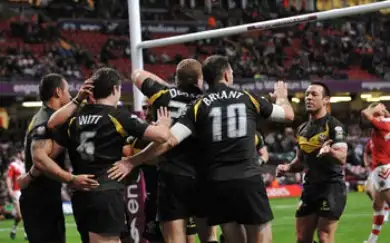How Green and Gold was my valley

It was hard to imagine anything exciting happening at yesterday’s Super League licensing announcement. We all knew that Wakefield would be given the boot. Journalists already had their reports written – indeed, they already had their reports published, with headlines such as “Time up for Wakefield” in the Guardian on Monday night. Yesterday morning’s sense of nothing-really-interesting-going-to-happen seems like a long time ago now.
There is a sense of vindication for those of us who said right from the outset that having the Crusaders in Super League was a bad idea – although any pleasure we might take from that is tempered by the realisation that people at the club seem to have been treated very shabbily.
The club’s decision to pull out of the licensing process was apparently made on Monday morning, yet players and coaches didn’t find out until moments before Richard Lewis announced it on Sky Sports News. Any fool knows that’s not the correct way to handle such a situation, and the result was Crusaders players past, present and – we imagined – future criticising the club for its poor handling of this and other situations on Twitter.
Mark Lennon complained of being owed money; Rhys Hanbury suggested that he must have signed his three-year deal on toilet paper and that fans should find another club more worthy of supporting; and we all know about what Keith Senior had to say. Nick Fozzard, of Castleford, pointed out that over the years Crusaders players had always complained about the “amateur” way in which the club was run.
Surely though, the assertion that Crusaders are amateurish won’t come as any great surprise. Admittedly yesterday’s farce was, well, farcical – but Crusaders RL has long been a byword for incompetence throughout rugby league. This is the club that at the end of its first season had to be taken on by new owners and moved across the country from Bridgend to Wrexham; the club that saw six players deported because it couldn’t get the right visas sorted out; the club that at the end of its second season was in administration.
The blame for all this undoubtedly falls with the RFL. Back in the bad old days of Paris Saint Germain and Gateshead Thunder, the belief was that if you set up a team of Australians anywhere you could create a Super League club out of nothing. Eventually we realised that growth had to come from the grassroots, hence the RL Conference that led to the emergence of clubs such as London Skolars and – of course – Celtic Crusaders, who entered National League Two with many players from Bridgend Bulls and other Welsh Conference clubs.
Things were looking up. Then along came the RFL and instead of allowing the club to grow at its own pace fast-tracked it into Super League, creating a team of Australians in the style of Paris Saint Germain and Gateshead Thunder. The previous decade had proved that such a method just won’t work, yet Richard Lewis and Nigel Wood hearkened to those shrill, impatient voices that cried out without any factual or logical basis, “Wales needs to have a Super League NOW! It’s now or never!!!”
What the Crusaders needed was leaving where they were – as a semi-professional club in south Wales for the best players that emerged from the amateur Welsh league – while rugby league in the region continued to develop naturally. Instead the club was over-promoted, had to rely on overseas players to be competitive and therefore couldn’t provide a pathway for any Welsh players, and ended up wrenched from its surroundings and trying to set down new roots in completely virgin territory. I’m sure someone somewhere will argue, but to me that doesn’t seem like much of a business plan.
There are two other annoying things that are worth mentioning. The first are those people – whether flat-capper or hyper-expansionist – who believe that this marks the end of expansion. One club drops out of Super League and people are genuinely saying that this is the end of all progress and development – when there are hundreds of amateur clubs flying the rugby league flag throughout the country, and more countries playing the game than ever before. For goodness’ sake there’s even another professional club in Wales. This is the sort of thing I meant at the start of the season when I said the RFL had put all the expansionist eggs in a flimsy Welsh basket.
The second annoying thing is that this will probably be the high-point of the whole Super League season, certainly as far as media coverage is concerned. A middle-aged man reading out the names of clubs – that’s “sport” apparently. Well last weekend we saw genuine sport – the Challenge Cup quarter finals. Unfortunately while the Challenge Cup is still decided by results on the pitch, Super League for the foreseeable future will be decided in boardrooms and accountants’ offices.
Keep Your Eye on Rugby League
twitter.com/Tony_LoveRL